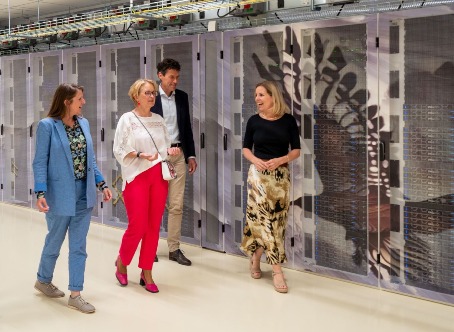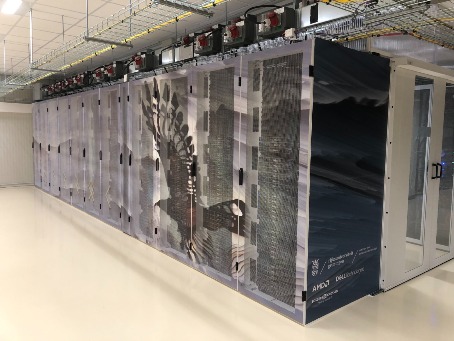Hábrók en CoDEX HPC-cluster officieel in gebruik genomen

(Foto: Ronald Koelink)
Rector Magnificus van de RUG Cisca Wijmenga heeft donderdag 15 juni jl. de officiële openingshandeling verricht van de nieuwe HPC-clusters Hábrók en CoDEX. "Een mooi event waar mijn wetenschap met behulp van Big Data samenvalt met mijn rol als rector magnificus".
De HPC-clusters worden ingezet bij grootschalig rekenwerk ten behoeve van wetenschappelijk onderzoek van de universiteit. De beide rekenclusters die staan opgesteld in het Coenraad Bron Center, zijn in de afgelopen periode opgebouwd en getest.
Hábrók
Het Hábrók-cluster is geleverd en mede ontworpen door Dell en Bossers & Cnossen. Het wordt aangestuurd door Openstack dat mede ontworpen is met StackHPC. Onderzoekers van vrijwel alle faculteiten maken gebruik van de HPC-clusters. Tijdens de bijeenkomst gaven onderzoekers Martijn Wieling (Faculteit der Letteren) en Thomas la Cour Jansen (Faculty of Science and Engineering) presentaties over hun onderzoek waarbij de HPC-faciliteiten zijn ingezet. Ook rector magnificus Cisca Wijmenga heeft in haar vorige functie als hoogleraar Genetica van het UMCG veelvuldig gebruikgemaakt van de universitaire HPC-voorzieningen.

State-of-the-art
De naam Hábrók is afkomstig uit de Noordse mythologie en staat bekend als de beste van de haviken en is een verbeterde versie van het vorige rekencluster Peregrine. Door gebruik te maken van de state-of-the-art hardware zal het Hábrók-cluster zorgen voor een veelvoud aan rekenkracht en de opslagcapaciteit verviervoudigen van 500TB naar 2PB. Het nieuwe cluster is uitermate geschikt om met grote databestanden te werken of om grote simulaties uit te rekenen.
CoDEX
Het CoDEX HPC-cluster zal worden gebruikt om lopend fundamenteel onderzoek te vergemakkelijken om het kosmologische 21 cm-signaal uit het vroege heelal (tussen 100 miljoen en een miljard jaar na de oerknal) te detecteren. Dit multinationale project wordt geleid door wetenschappers van het Kapteyn Astronomical Institute en ASTRON. CoDEX zal enkele petabytes aan astronomische waarnemingen verwerken met de internationale LOFAR-telescoop.
Number crunchers
De RUG heeft zich altijd geprofileerd op het gebied van High Performance Computing (HPC) met state-of-the-art computers. Met name de Groningse chemici en sterrenkundigen ontwikkelden vanaf eind jaren vijftig van de vorige eeuw een voorliefde voor geavanceerde computers, de zogenaamde ´number crunchers´. De nieuwe rekenclusters kunnen rekenen op een enthousiast gebruik van de grote rekenaars van de RUG.
